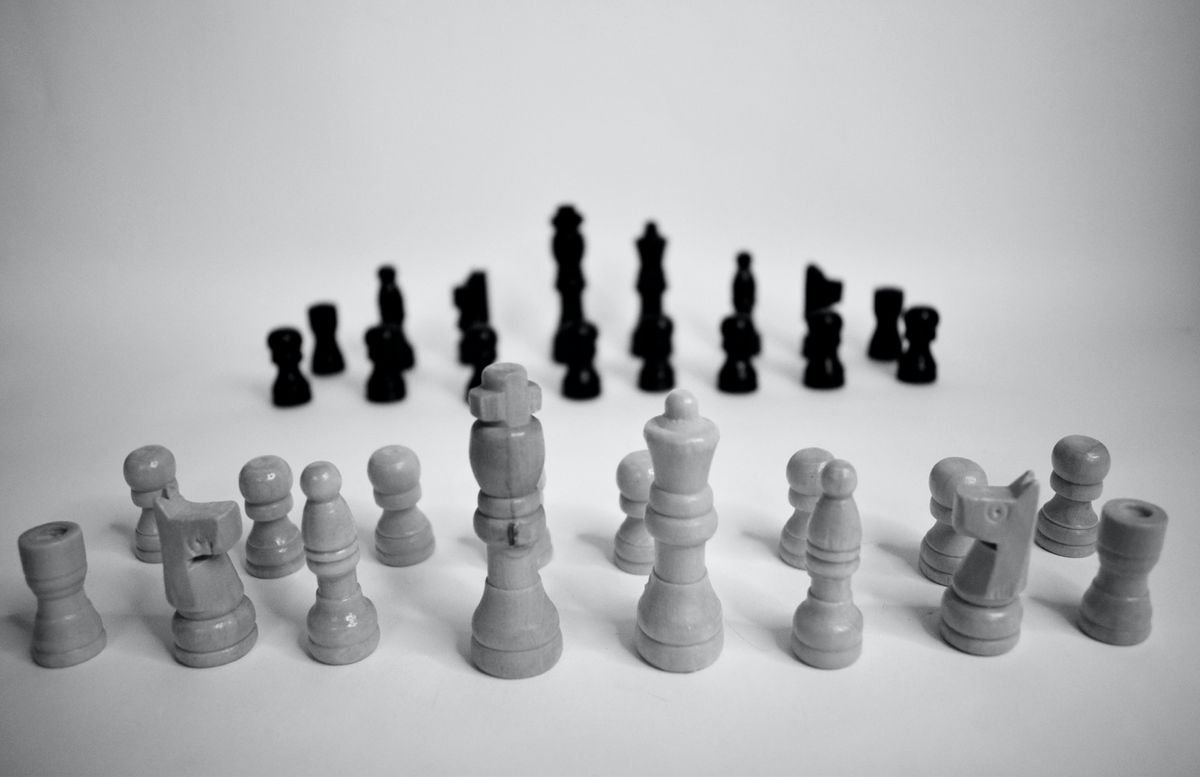The Core Assumptions Behind Left Wing and Right Wing Ideology
Everyone knows that politics in the United States is spiraling down and ever deeper hole of illiberalism and hatred. Partisans on both sides of the conflict will insist that they're right, the other side is wrong, and here's all the evidence why. But if you take a step back, a fascinating pattern...

Everyone knows that politics in the United States is spiraling down and ever deeper hole of illiberalism and hatred. Partisans on both sides of the conflict will insist that they're right, the other side is wrong, and here's all the evidence why. But if you take a step back, a fascinating pattern that is much older than our current political strife emerges. The fundamental reason behind our political conflict is not differences in policies, cultural preferences, or malice. The conflict goes far deeper. It's a battle of fundamental beliefs about the nature of the world.
The beliefs about how the world works, how it should work, and how (if at all) it should be changed are the foundation of our social world views. At the root of all ideologies that we chose to be a part of, are our answers to these three simple questions. It seems likely that the perennial political conflict in free societies springs from a radically different understandings about the nature of reality. The conflict is never able to fully resolve because there is no objective answer (that we know of) to these questions.
While infinite variations of ideology are possible, in the American context they tend to cluster and produce two opposing sides. Each side then gives birth to dozens, or hundreds of ideologies. While many may seem unrelated, all ideologies on one side or the other will ultimately share their fundamental assumptions, and differ only on how to respond to them. I can't speak to how they've looked in other places and times, but in contemporary America, they're crudely approximated in Left wing and Right wing ideas.
A note on the words Right and Left. Unfortunately, most words that encapsulate beliefs have become tainted with political connotations. Right and Left have almost nothing to do with political parties. They are merely clusters of beliefs spawned from a world view. You could call them conservative of progressive. Or "status quo" and "change the world".
When viewed from this angle, it's much easier to detach from contemporary political debate. Democrats and Republicans are arbitrary avatars of timeless differences in opinion, not sources of it. Indeed, most Americans don't strongly identify with these parties, and the parties themselves have shifted their positions every few decades. Furthermore, different wings of each party can and often do share the same fundamental beliefs about the world, especially at the extremes.
The farther up you go from our three simple questions, the more nuanced and complicated opinions become. Right and Left wing beliefs are only one layer up, but the politics they spawn are legion, and far from confined to political parties. To get a sense of the divide in America, it's best to look at the extremes of the Right/Left spectrum. Where they disagree and where they agree can teach us about pretty much every debate in politics today.
Fundamental Left Wing Beliefs
I'm starting with the political Left because Left wing ideologies are ones of change. The Left claims that there's something wrong with the world, and the way it currently works. It also claims that change is both desirable and possible to produce. Since Left wing ideologies claim to know a better way, the burden of proof is on them.
In our current Western context, here are the core assumptions of the extreme political Left.
Belief One
There's no such thing as human nature. It's the side of Nurture over Nature. Genetics play a limited if any role in the behavior of individuals and societies. Most or all of our beliefs and actions are products of cultural and social conditioning. That conditioning is often the result of "The Powerful" building structures to oppress and control us. If you are for the status quo you are either an oppressor, or have Stockholm syndrome.
Belief Two
We are members of a community first, individuals second. No man is an island. No matter how much we'd like to believe otherwise. We rely on others for everything in our world. We own neither our success or failure. The collective, not the individual is the foundation of society. Our actions are merely manifestations of the collective. We must acknowledge that our individual experiences are less important than our collective experiences. Progress is only possible when we better the collective, not the individual. Each individual is merely an avatar for their group, and carries the collective culture, traits, beliefs, and guilt of that group.
Belief Three
Number three is the logical result of one and two. Everything about humans and our communities can and should be changed and controlled. Since there is little or no place for human nature, we know we can change almost anything about a human system. Because we're all avatars of our groups, and some groups are worse off than others, we are obligated to fix this. Any and all issues in society can and should be addressed by controlling different groups in relation to each other.
The philosophers have only interpreted the world, in various ways. The point, however, is to change it.Karl Marx
Belief Four
The real world is always compared to an abstract, Utopian ideal. Because all human behaviors and societies are constructed, (usually to oppress), history, other cultures, and other places are not used as reference points. All comparisons are made against an abstract world created in the minds of would be reformers, not something that has ever existed in reality. Naturally this means most progress is viewed as an illusion, and the real world will always need radical change. A perfect world could be achieved if we were just able to overcome the control of oppressors, build solidarity, and take bold collective action. The reason it hasn't happened is because of domination from "The Powerful", and their control and division of everyone else.
Belief Five
Everything is seen in absolutes. You're either with us or against us. Far Left wing ideologies are all encompassing world views, and like far Right ideologies, there is no room for uncertainty or humility. In a world where you have all the answers there's no need for dissent or difference. Any deviations from the orthodoxy of your ideology is an attack on it, that must be met with force. Tolerance, debate, or the marketplace of ideas are tools of the oppressor to weaken and undermine you. There are only allies and enemies.
Fundamental Right Wing Beliefs
The hard Right is often portrayed as the inevitable reaction to the hard Left, and there's some truth to this. But it's better to think of the hard Right and Left as mutually reinforcing, and symbiotic. You will never find one present in a society without the other in similar proportion. While most fundamental hard Right Beliefs are opposite of the hard Left, they do share several. These commonalities are far more interesting than their respective differences.
Belief One
Human nature is monolithic, static, and all encompassing. It's the side of Nature over Nurture. Things are the way the are because that's the way humans were made, and that's how they should stay. Depending on the flavor of Right wing belief, either god or genetics will be used to explain this. Our beliefs and actions should follow the plan set out for us. Because we are made this way. Trying to change our societies is futile at best, and destructive at worst.
Belief Two
We are members of a community first, individuals second. No man is an island. No matter how much we'd like to believe otherwise. We own neither our success or failure. Religion, country, and family are the fundamental units of society, and we are merely avatars of each. Everyone has a responsibility to serve the collective in that order. Our actions, no matter how small, can corrupt the collective, and their sanctity must be protected. We must all work to enforce norms and preserve what we have.
Belief Three
Number three is the logical result of one and two. Everything about humans and communities cannot and should not be changed, only preserved. Since human nature, is immutable, we know we can't change our societies. Since human nature is correct either because of evolution or god, attempting change will only backfire. Things are the way they are for a good reason. Our only job is to undo the damage done by those seeking foolish change.
Belief Four
The present world is only compared to a romanticized, historic ideal that never existed. In the better days of yore, people were strong, hard working, and more virtuous. Things were good. Rather than holding to traditions that brought us success, we have attempted radical change or slipped into decadence. Disaster has been the result. Our current problems serve as bright warning signs showing that we have strayed from the path. They show us the folly of ignoring the wisdom of the past. The only way we can bet back to the good times of the past is by abandoning our libertine ways and embracing a return to traditional values and life.
Belief Five
Everything is seen in absolutes. You are either with us or against us. Far Right wing ideologies are all encompassing world views, and like far Left ideologies, there is no room for uncertainty or humility. In a world where you have all the answers there is no need for dissent or difference. Any deviations from the orthodoxy of your ideology is an attack on it, that must be met with force. Tolerance, debate, or the marketplace of ideas are tools of radicals seeking to corrupt our society. There are only allies and enemies.
Follow the Threads
If you look carefully at any Left/Right political movement or statement, you will find that it's threads lead here. Of course there are many other ideologies and worldviews out there, and not all fit into a nice category. People usually hold a mixed set of "right and Left'' beliefs, and they combine them in new ways. In American politics, Right and Left wing beliefs often show up in counter intuitive ways.
For example, environmentalism is usually associated with Left wing politics in the US. But the desire to embrace nature, reject technology or development, and conserve what we have is actually a conservative belief. Environmentalism claims nature (which was here before us) is better, and should be preserved. On the other hand, development, energy production, and growth are typically associated with Right wing politics in the US. In reality the desire to develop, to tear down forests and build cities and farms is actually a progressive attitude. Nature is a flawed world for humans, but change is possible. We can make the world better by developing it to suit our needs, and using tech to advance our species.
There are many of these contradictions in politics today. Furthermore, I've totally ignored the massive spectrum that each of these ten beliefs lie on. I have listed them in the extreme for clarity, and no real political movement holds everyone too the maximum extent possible.
Indeed, most of the worlds more interesting ideas and systems are a synthesis of different beliefs at different intensities. Is human behavior nature or nurture? 50/50, 80/20, 90/10? Each answer will yield an entirely different world view. This produces a gargantuan number of potential ideas and beliefs, so why did I focus on the extremes?
In difficult times, people get scared and circle the wagons. Nuance is stripped away, and like two vortexes, the extreme Left and Right suck us into their orbits. The most interesting, productive, and useful ideas lie in the combinations produced in the middle, not in purity obsessed extremes. Understanding them, how they look and where they come from, can help you navigate an increasingly hostile world. More importantly it can allow you to detach from the day to day rhetoric used to blind you with fear and anger.
By seeing the roots of an idea, you can study its merits objectively. Does it makes sense for you or the world? At the very least you will become depolarized. You will be able to see through propaganda, and focus on the motives behind it. Only then can you decide what, if any action you should take.
Most importantly you will gain humility that inoculates you against extreme emotions or a desire for violence and control. When you see that the root of our conflict is an age old debate about fuzzy questions with no easy answers, your desire to topple, burn, and kill evaporates. Instead, you might find yourself in a place where you could help build a more peaceful, more tolerant, and dare I say better world.



Comments ()